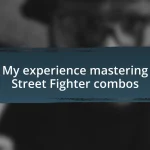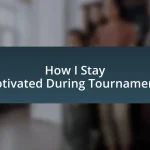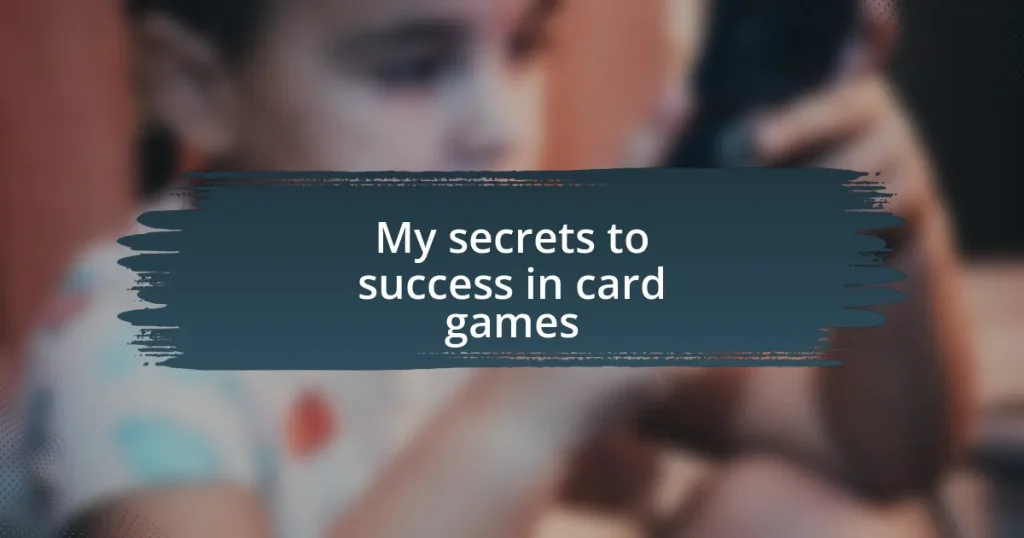Key takeaways:
- Studying different game strategies, including bluffing and timing, can significantly improve gameplay effectiveness.
- Online simulations offer a low-pressure environment for practicing techniques and analyzing gameplay to enhance performance.
- Learning to read opponents’ body language and betting patterns can provide valuable insights into their strategies.
- Effective bankroll management and developing a winning mindset are crucial for long-term success in card games.
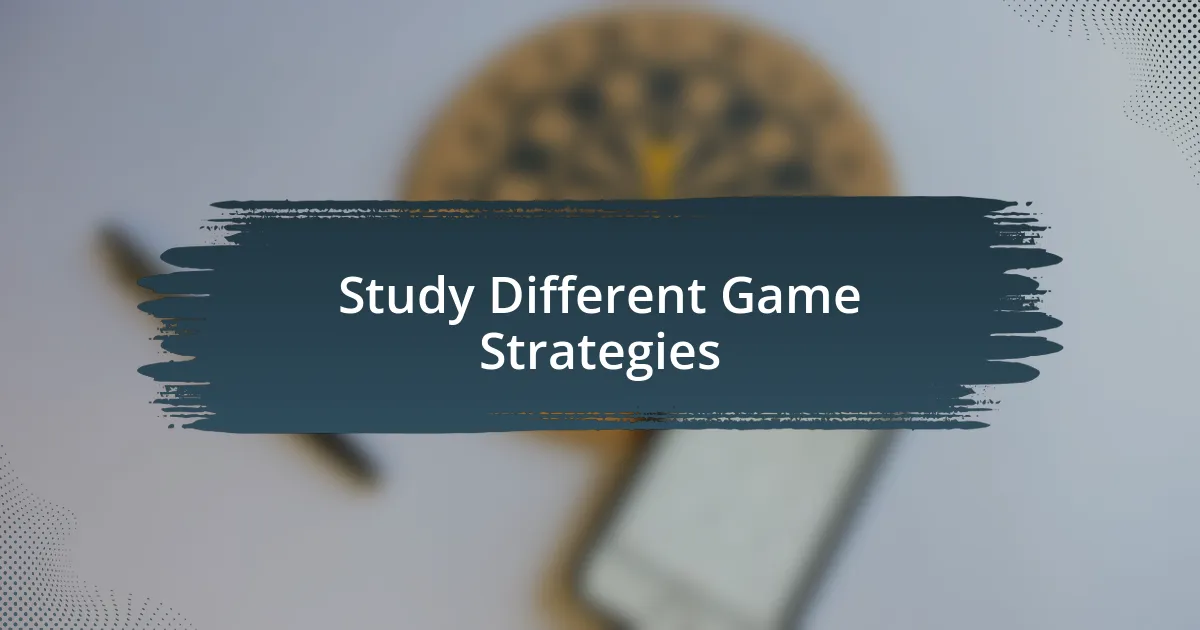
Study Different Game Strategies
Diving deep into various game strategies has been a game-changer for me. I remember a time when I played against a seasoned opponent who seemed unbeatable. It wasn’t until I studied their tactics—finding patterns and understanding their decision-making—that I finally turned the tables. Have you ever thought about what might be hidden in your opponents’ strategies?
Exploring different strategies can reveal surprising insights. For instance, while studying a particular card game, I stumbled upon an unconventional approach that completely shifted my gameplay. It combined bluffing with precise timing, and I was amazed at how effective it was. Have you ever encountered a strategy that made you rethink your whole approach to the game?
It’s essential to embrace both victory and defeat as learning opportunities. I recall several tournaments where I lost but gained invaluable knowledge about strategic variations. Each game taught me not just how to play but how to adapt and improve. This adaptability is crucial—what strategies could you explore to enhance your own gameplay?
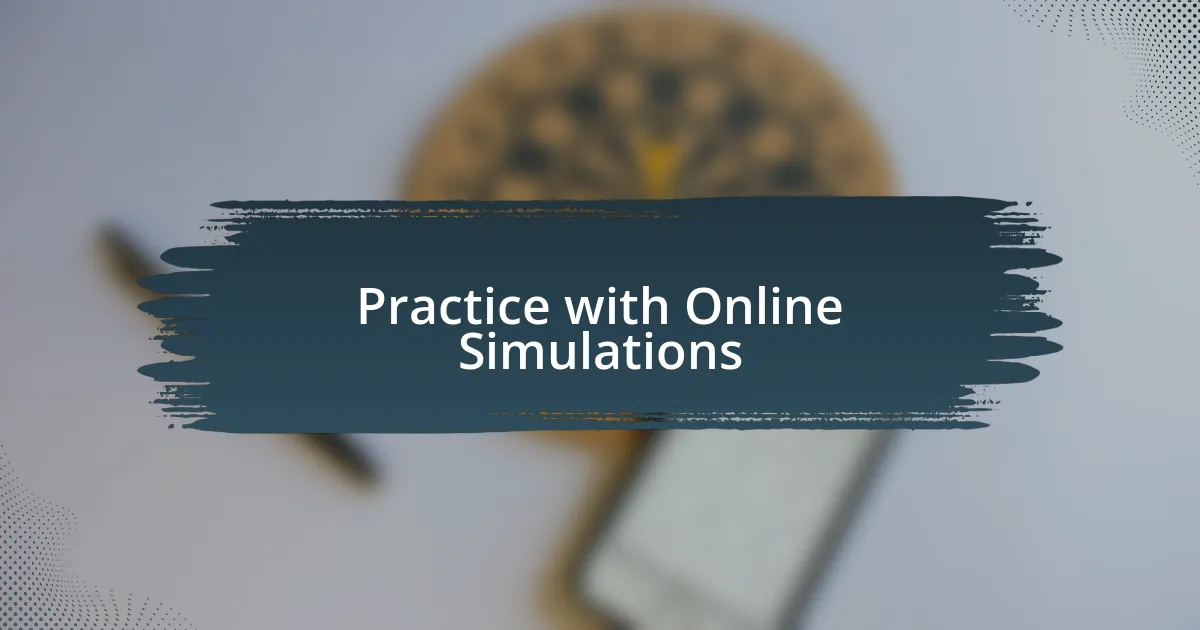
Practice with Online Simulations
Practicing with online simulations has become an invaluable part of my card-game journey. One memorable experience was when I discovered a simulation platform that mirrored a competitive environment closely. It allowed me to test various strategies without the pressure of real opponents. Have you ever found solace in an online platform where you could experiment freely?
In my early days of using online simulations, I sometimes felt overwhelmed by the vast number of games available. However, I gradually learned to focus on specific simulations that reflected my areas for improvement. I vividly recall honing my bluffing skills in a virtual poker setting, where I could safely make mistakes and learn from them. It’s incredible how a digital simulation can enhance your confidence in real-life scenarios—do you find that certain platforms provide a safer space for growth?
Moreover, engaging in these online simulations offers not just practice but analysis of my gameplay. After each match, I would review my decisions and consider alternative strategies that could have changed the outcome. This analytical approach has transformed my understanding of the game, enhancing my overall performance. Do you think analyzing your simulated games could unveil hidden opportunities for advancement?
| Feature | Online Simulations |
|---|---|
| Real-life Practice | Next-level strategy and skill development through analysis and strategic application |
| Pressure Environment | Lowers pressure while allowing for freedom of experimentation |
| Cost | Generally low or free access to gameplay |
| Game Selection | Wide variety of games to choose from |
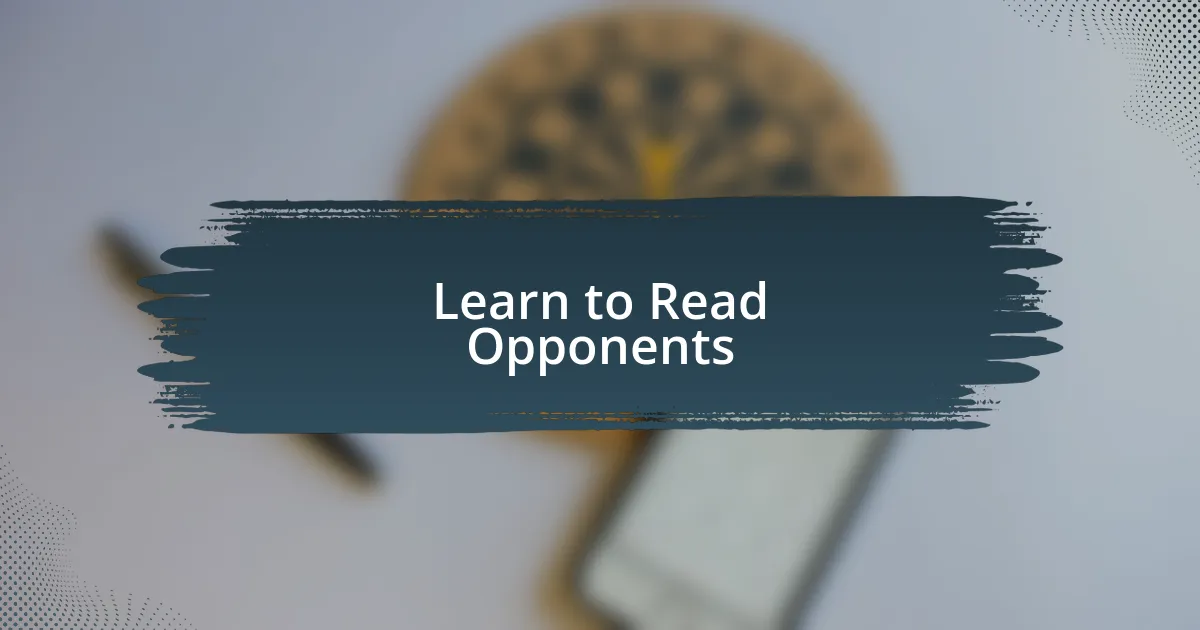
Learn to Read Opponents
Learning to read your opponents is crucial in any card game. I remember my first major tournament—there was this moment when I noticed how my opponent shifted in his seat every time I bet aggressively. It clicked for me that body language can convey so much. By paying attention to these subtle signs, I could gauge whether he was confident or uncertain. It’s the small details that often reveal a wealth of information.
Here are a few tips that have helped me:
- Observe Facial Expressions: A frown or raised eyebrows can hint at discomfort or surprise.
- Watch Body Language: Leaning forward often indicates interest, while leaning back might suggest caution or disengagement.
- Note Verbal Cues: Changes in tone or speed of speech can signal excitement or nervousness.
- Track Betting Patterns: Consistent patterns might indicate a strategy, while erratic betting can reveal uncertainty.
- Focus on Timing: Quick decisions can suggest confidence, while hesitation might indicate doubt.
Each of these insights has deepened my understanding of the game, allowing me to anticipate my opponents’ moves better. I’ve found that the more I study their behaviors, the more effectively I can adapt my strategy in real time.
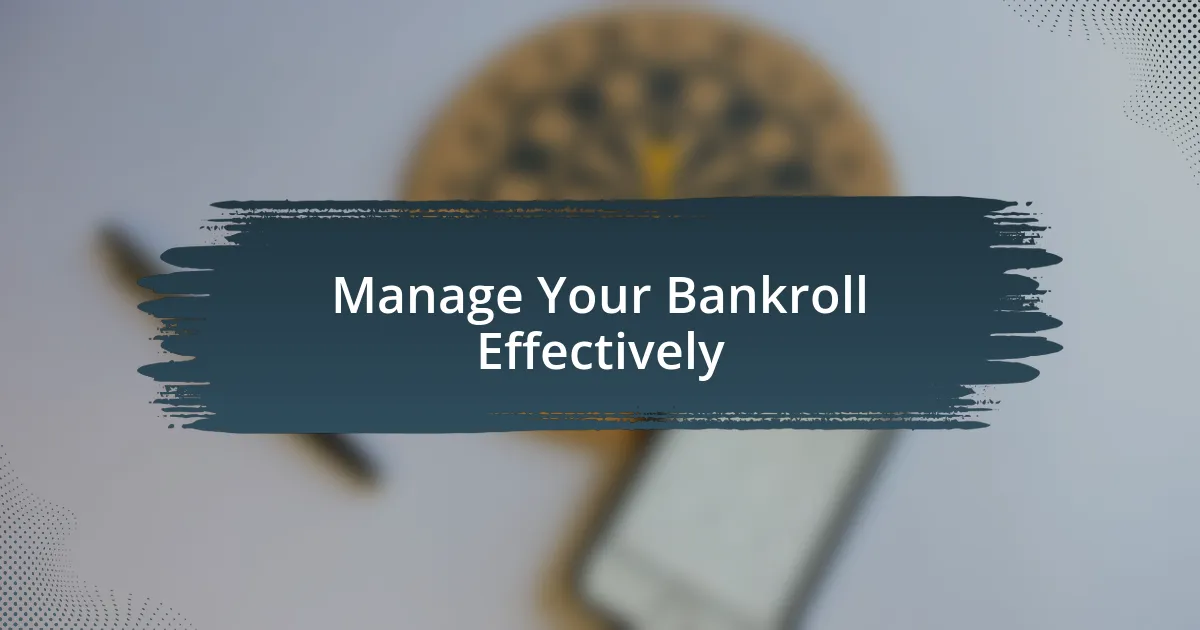
Manage Your Bankroll Effectively
Effective bankroll management is the foundation of any successful card game strategy. I’ve had my fair share of rollercoaster sessions where emotions ran high, and I’ve learned the hard way that it’s easy to chase losses. Have you ever found yourself doubling down on a bad streak? That moment of desperation can be a slippery slope, leading to bigger losses.
One strategy that truly transformed my approach is setting strict limits. For instance, I allocate a specific amount for each session and commit to walking away once I’ve either reached that limit or have met my profit goals. This financial discipline not only protects my bankroll but also helps me keep my emotions in check. I feel a sense of control when I follow this rule—it’s like having a safety net in what can be an unpredictable environment.
Another key aspect is regularly reassessing my bankroll. I find it beneficial to take stock after every few sessions to see if my strategy aligns with my financial goals. Have there been patterns in my wins or losses that I need to address? This kind of reflection allows me to adapt, ensuring I’m constantly on a path toward improvement. Balancing joy and caution, I’ve discovered that managing my bankroll effectively is as satisfying as a well-played hand.
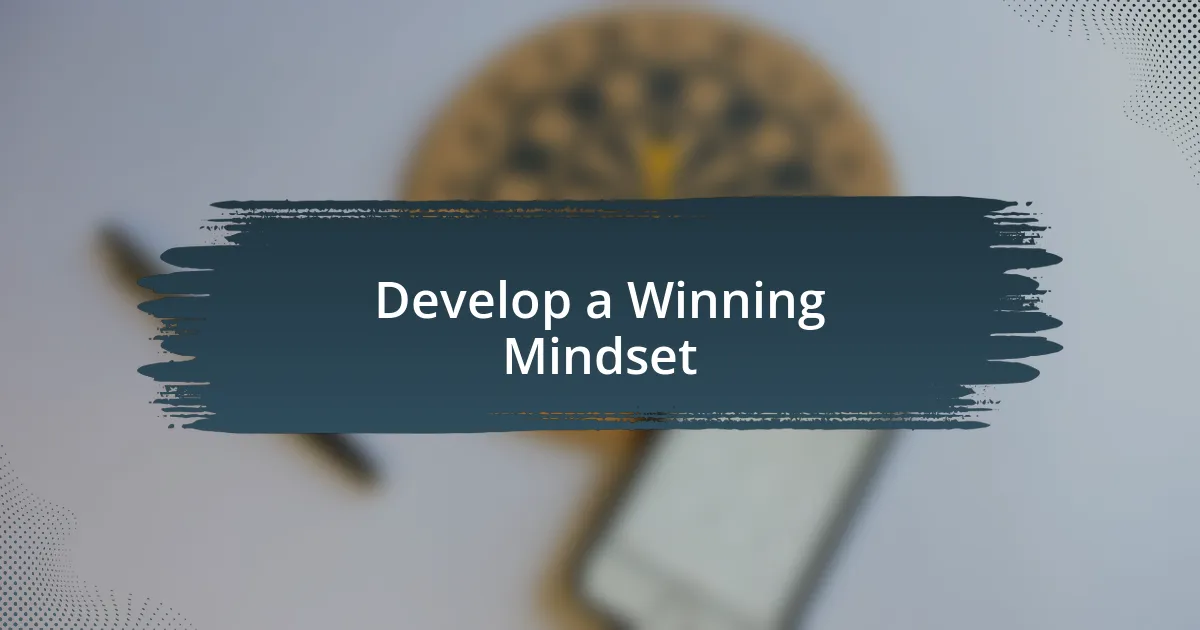
Develop a Winning Mindset
Developing a winning mindset is crucial for long-term success in card games. I remember a game night when, despite my best strategies, I faced a series of unfortunate hands. Instead of allowing frustration to cloud my judgment, I took a deep breath and focused on what I could control—my thoughts and decisions. Have you ever felt that overwhelming urge to give up when things aren’t going your way? I’ve been there, and I can tell you that cultivating resilience is key.
I’ve found that visualization techniques can really enhance my mindset. Before big game sessions, I spend a few moments picturing myself executing my strategies flawlessly. This mental rehearsal builds my confidence and prepares me for whatever the game may throw at me. It’s fascinating how a little mental preparation can pivot your performance from anxious to assured. How often do we neglect the power of our minds in favor of focusing solely on tactics?
Moreover, embracing a growth mindset has shifted my perspective. Instead of viewing a loss as a defeat, I see it as a valuable lesson. After a particularly tough game where I misplayed, I took time to analyze what went wrong. This reflection turned disappointment into motivation, sparking a new commitment to improvement. Can you recall a moment where a setback led to a breakthrough? These experiences remind me that every game, win or lose, is a stepping stone towards a greater understanding of the craft.
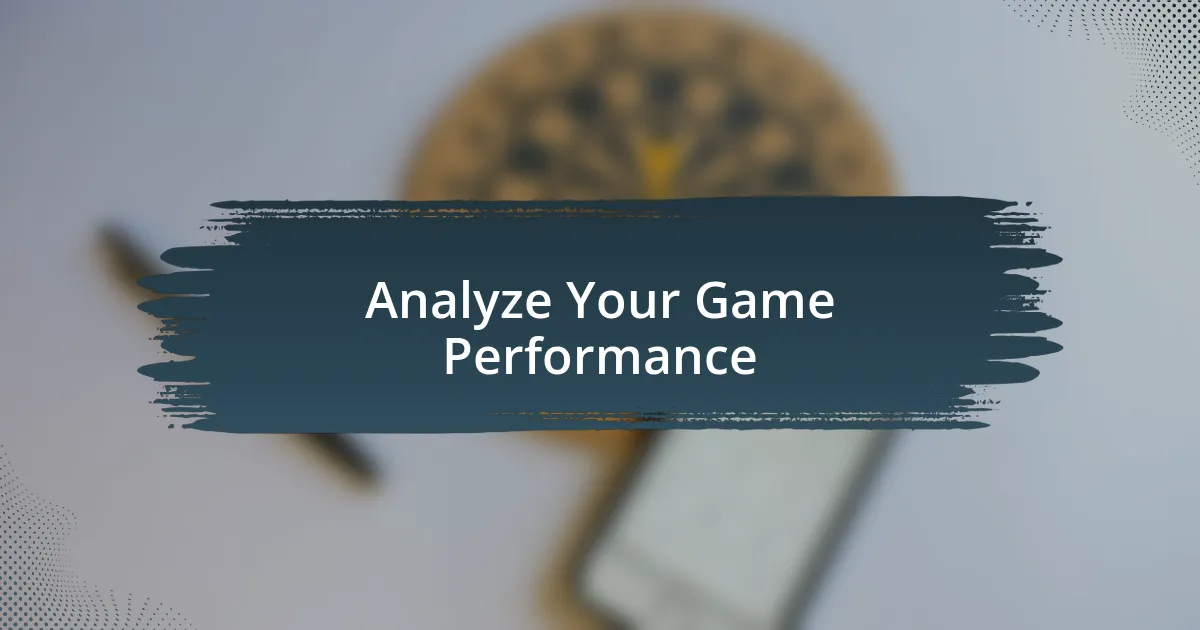
Analyze Your Game Performance
Analyzing your game performance is a vital step toward improvement. After each session, I like to take a moment to reflect on my decisions and outcomes. For instance, there was a time when I lost a match because I underestimated my opponent’s strategy. By dissecting that game, I realized my error stemmed from not paying enough attention to their card play. Have you ever noticed how a single oversight can have lasting consequences?
When I review my performances, I often keep a journal where I note key moments. This helps me identify patterns in my playstyle and decision-making under pressure. I recall one particular instance where I consistently hesitated before making aggressive moves. That habit was rooted in fear of failure, which only led to missed opportunities. How about you? Are there habits you find yourself repeating that hinder your success?
Another tool I’ve found helpful is seeking feedback from fellow players. Discussing critical moments with others can provide fresh perspectives. I remember a colleague pointing out how my defensive play often opened up openings for counterattacks. That insight was a game-changer for me. Engaging in these discussions not only enhances my understanding but also strengthens my connection with the gaming community. Have you ever shared your experiences with others and discovered new strategies in the process?

